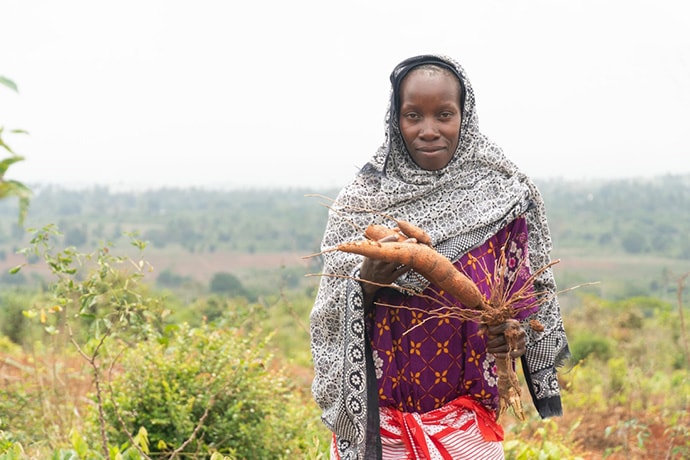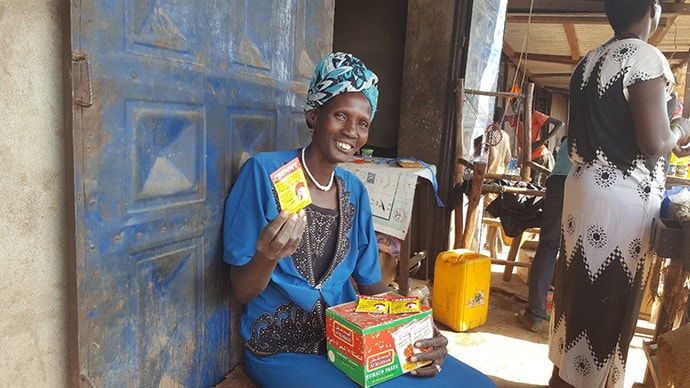Blog
Posted on October 13, 2021
By Beth Roberts, Director, Center for Women’s Land Rights, Landesa

Photo credit Landesa. Zainabu, from Kisarawe district, Tanzania, holds cassava that she dug up on her hillside farm.
Around the world, women are the backbone of agriculture.
From the rice paddies of Asia to the maize fields of sub-Saharan Africa, women are so often responsible for shouldering the labor of farming – they till, plant, water, and harvest crops that feed households and whole communities.
Continue Reading
Posted on September 29, 2021
By Cathy Herholdt, Senior Communications Director, World Concern

Photo credit World Concern. Abuk Lino at her shop.
When COVID-19 forced businesses to close and people to stay home in Kuajok, South Sudan, families had to spend their savings to survive. When things reopened, many were unable to restart their businesses.
But for widow and mother of four, Abuk Lino, her savings group enabled her to not only feed her family during the pandemic shutdowns, but to keep her small shop going after the village market reopened.
Continue Reading
Posted on September 22, 2021
By Mark Horosowski, MovingWorlds
With Kate Cochran, Upaya Social Ventures
 The United Nations General Assembly is this week, and quite frankly, I’m not looking forward to it. It’ll be another circuit of high level meetings and catchy headlines telling the world that we’re falling even further behind in our attempt to achieve the Sustainable Development Goals (sadly, we are… and corporations aren’t doing nearly enough).
The United Nations General Assembly is this week, and quite frankly, I’m not looking forward to it. It’ll be another circuit of high level meetings and catchy headlines telling the world that we’re falling even further behind in our attempt to achieve the Sustainable Development Goals (sadly, we are… and corporations aren’t doing nearly enough).
Governments will point fingers at each other and the private sector. The private sector will blame governments and consumers. Financiers like Blackrock will fund catchy PR campaigns that will distract us from the fact that they are creating the very issues they are claiming to be solving.
Pundits, “thought leaders”, and global executives will write compelling op-eds claiming that if only they were given more resources, they could solve all the problems. Then, as quickly as it came, the debates will pass and we’ll return to a state of normalcy, perhaps with just a little more frustration with our global policy makers and international institutions.
Continue Reading


 The United Nations General Assembly is this week, and quite frankly, I’m not looking forward to it. It’ll be another circuit of high level meetings and catchy headlines telling the world that we’re falling even further behind in our attempt to achieve the Sustainable Development Goals (sadly, we are… and
The United Nations General Assembly is this week, and quite frankly, I’m not looking forward to it. It’ll be another circuit of high level meetings and catchy headlines telling the world that we’re falling even further behind in our attempt to achieve the Sustainable Development Goals (sadly, we are… and